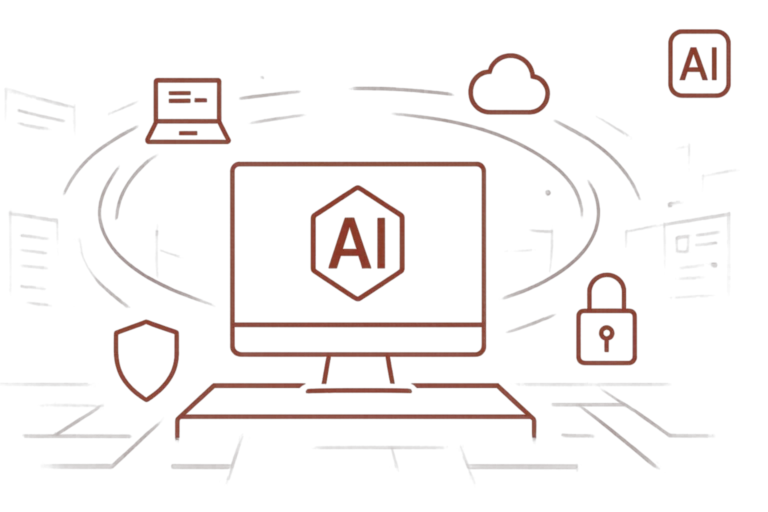Fulfil your obligation now to train your employees safely and effectively in the basics of AI competence – our basic training course provides practical knowledge that is specifically geared towards the responsible use of AI technologies and compliance with legal requirements.

Companies that use AI tools such as ChatGPT or Microsoft Copilot are obliged to train their employees accordingly from February 2, 2025. This training is necessary to ensure compliance with the new provisions of the AI Act and to ensure that all employees have the necessary knowledge about the safe and ethical use of AI systems.
This applies to the entire process of AI use – from categorization and whitelisting to ensuring that all AI decisions remain traceable and that human intervention is possible if necessary. One of the biggest challenges is the legally compliant use of AI in various areas of the company.
Particular attention must be paid to the transparent labeling of AI-generated content, obtaining and documenting consent, processing personal data with a legal basis, avoiding automated discriminatory decisions and using AI tools in compliance with data protection regulations in accordance with the GDPR.
Due to the increasing integration of AI technologies and the new requirements of the AI Regulation, companies are faced with the challenge of reconciling efficiency and legal compliance. Careful implementation and department-specific adaptation of AI processes in sales, marketing, finance and HR are essential.
Building and training the necessary expertise of your employees to meet the requirements of the AI Regulation.
Our training course covers all the key principles of the AI Act for handling sensitive data.
In order to fulfil the legal requirements of the AI Regulation, it is necessary to act proactively within the company and implement preparatory measures. With the help of these measures, you can establish a solid structure within your company to efficiently fulfil the legal obligations of the AI Regulation. This will ensure that all relevant processes are adapted and the corresponding standards are adhered to. Below you will find an overview of the training content that awaits you:
The introductory lesson explains the AI Regulation (KIVO), which came into force in August 2024, and the resulting obligation for staff to have sufficient AI competence, with fines of up to €15 million for non-compliance. The first requirements became applicable in February 2025, with companies required to create internal guidelines for efficient implementation and employees responsible for complying with them. The training serves as a distillation of important laws such as the GDPR, BDSG, and KIVO in order to teach the legally compliant use of artificial intelligence in everyday work.
Categorization of AI applications and creation of a whitelist. The whitelist helps to maintain an overview of permissible AI applications. Companies should regularly check whether the classifications and the whitelist are up to date.
Processing of personal data with legal basis. All data processing procedures must be transparent and legally justified. Employees will receive regular training to ensure data protection.
Ensuring that AI decisions comply with data protection guidelines. People should always be able to understand the decisions made by AI and intervene if necessary. Regular audits of AI decisions help to improve the systems.
AI can make routine tasks easier, but it must always be used transparently, with clear labeling of AI-generated content and chatbots. When using AI for customer profiling, personalized campaigns, and automated decisions, strict legal requirements must be observed, especially with regard to consent and data protection. AI-generated texts, images, and videos pose copyright risks and must not lead to misleading advertising or portray unrealistic product characteristics.
It shows how artificial intelligence can manage numbers and data more efficiently, but must never be allowed to make legally relevant decisions on its own. Particular attention must be paid to the legally compliant use of AI tools in compliance with the GDPR and the AI Act, including documented traceability of AI-based financial analyses. Sensitive financial data must be encrypted and managed with restrictive access, whereby clear responsibilities for data processing are essential.
The use of artificial intelligence for pre-sorting applications and managing employee data is explained, whereby automated discriminatory decisions are prohibited. Transparency, explicit consent, and strict purpose limitation in accordance with the GDPR are essential in data processing. Human control remains indispensable, especially in sensitive processes such as sick leave notifications, in order to ensure legally compliant HR processes.
Work through the course at your own pace, as you will receive your own Academy access. This gives you online access to the course content via any web browser.

Below you will find answers to frequently asked questions about AI training. Do you have further questions or are you unsure which training course is right for your company? Send us a short message – we will be happy to take the time to discuss your requirements in detail.
Yes, our basic AI skills training is always up to date.
In order to live up to our claim of always being one step ahead, we ensure that our basic AI skills training always reflects the latest findings and developments in AI Act.
All employees, especially those who use artificial intelligence software in the company, in order to efficiently fulfil the legal obligations of the AI Regulation.
Our training is characterised not only by its topicality and expertise, but also by the recognition of learning success. Every successful completion of the training course is rewarded with a legally compliant certificate, which is far more than just confirmation of what has been learnt. The certificate serves as an important official document for presentation during audits and inspections by the authorities.
As this is an online course where you can determine the pace and learning frequency yourself, the duration of the course varies. This gives you the opportunity to customise the learning units and complete them at a pace that suits you. The ability to access the learning content from any location allows you to progress flexibly.
AI training helps to reconcile the AI Act and the GDPR by promoting the data protection-compliant use of artificial intelligence and ensuring that all data protection requirements, such as transparency and consent, are met.

Sie sehen gerade einen Platzhalterinhalt von YouTube. Um auf den eigentlichen Inhalt zuzugreifen, klicken Sie auf die Schaltfläche unten. Bitte beachten Sie, dass dabei Daten an Drittanbieter weitergegeben werden.
Mehr Informationen